Over the years, RAMzine has conducted hundreds of interviews. Many captured great quotes about upcoming tours or recording processes. But some conversations went deeper. These were the moments when artists stopped being brands and started being people. When they talked about loss, fear, creativity, and connection.
These are the conversations we’re bringing to the forefront once again in our Archive Gold series. We’re republishing these interviews now because their insights deserve a second life.
The artists in Archive Gold trusted us with their thoughts, their vulnerabilities, and their perspectives on everything from the creative process to existential questions. Years later, their words still carry weight.
Originally published in RAMzine Issue 31 on December 24, 2021.
Creating art during a global pandemic required unprecedented adaptation. For Of Mice & Men, it meant crafting an entire album through computer screens and internet connections, with band members separated for nearly two years.
In this conversation, Aaron Pauley, lead vocalist and bassist of Of Mice & Men, opens up about the band’s Echo album. This interview captures a unique moment in music history – when artists had to reimagine their entire creative process while confronting existential questions about isolation, connection, and what it means to be human. The result is a conversation that speaks to anyone who has ever felt out of control, used art to process difficult emotions, or wondered how we truly connect with one another in an uncertain world.
Interview sections:
- Creating in Isolation – The COVID impact and remote album creation.
- The Creative Process – Digital vs traditional collaboration methods.
- The Philosophy of Metal Music – Deep dive into metal as emotional expression.
- Human Connection Through Shared Experience – How music creates community.
- 2021’s New Era of Music – The Echo album and release strategy.
- Fighting Gravity – Control, acceptance, and existential themes.
- Art, Interpretation, and Personal Connection – How listeners create meaning.
- Grief, Loss, and Musical Tribute – The ‘Helplessly Hoping’ cover story.
- The Future of Creative Expression – Ongoing creativity and human uniqueness.
- Since This Interview – 2025 plans.
Creating in Isolation: The Remote Album Process
Victoria [VP]: How are things with COVID over in California?
Aaron Pauley [AP]: I think for the most part everything has sort of reopened. I’ve been to Disneyland a handful of times, it feels sort of like a return to normalcy. There are still certain guidelines about certain businesses that want you to wear masks indoors and whatnot. But it feels like kind of a slow return to normalcy. We’ll see how long it lasts.
VP: Yeah! We (UK) are just starting to go back into restrictions, so it’s work from home again now for those who can, it’s masks in all indoor venues and you need to show your Covid passport in certain venues.
AP: Ah I’m sorry to hear that, it’s hard mentally to isolate or be isolated.
VP: Yeah we’ve only just started easing back into gigs! I think they are still going ahead at the moment, just with restrictions. Just fingers crossed for festivals, Download and all of that next summer! It’s hard to predict it all, isn’t it?
AP: Yeah and that’s our first planned tour next summer. It’s really hard, I’ve said it a bunch of times, it’s almost a cliche at this point but it’s like you can plan for the next 10 years, but you can’t plan for the next 10 minutes. Hopefully, everything can be resolved, and everyone can enjoy it safely as that’s the other thing too, it’s not lost on me that music and live music is an outlet for people to blow off steam and de-stress. It doesn’t necessarily fully serve its purpose if going to an outdoor event can cause more stress because of the worry of something that you can’t see so that’s another factor of it, just saying “We’ll just open up” it’s not really the thing because it’s not really a stress-free environment. I’m really sorry to hear that, I hope that everybody can stay safe and find a way through it.
“You can plan for the next 10 years, but you can’t plan for the next 10 minutes”.
VP: Have you guys managed to play many shows this year?
AP: Zero. Zero since February 2020. Unless you count Twitch, but even then, it’s not more than one of us performing at a time. We haven’t played any shows, but we were able to make an entire record literally over Zoom and Dropbox. Up until about a month ago, when we actually all got together in LA and had lunch with each other, we hadn’t seen each other. We went a year and nine months without seeing each other in person.
VP: That’s a long time, almost 2 years!
AP: But I’m thankful for things like Zoom, even with all of its technical problems. There is still the ability to socialise and there is the ability to be creative so I’m very grateful for that.
The Creative Process: Digital Collaboration vs Traditional Methods
VP: Do you think that this album would have been different if you were in a room making it together? Do you think that it changed the way it turned out by communicating digitally?
AP: I think inevitably it would be different had any part of the circumstances been different because, for us, music and songwriting is a genuine and honest exercise in expressing whatever you are thinking and feeling at the moment.
“For us, music and songwriting is a genuine and honest exercise in expressing whatever you are thinking and feeling at the moment”.
I think if you were to change any of those things [meeting over Zoom and communicating digitally] it probably would have affected it. But it’s really hard for me to say how. Almost like a butterfly effect kind of thing, if you were to change any part of it and any of the thoughts, feelings, emotions or anything that we were trying to convey were different, then the music would probably be different.
But I think overall the way that we created it wasn’t terribly different because the way that we tend to work together when we are doing pre-production or songwriting is that we are usually huddled around somebody’s computer. Everybody’s got their computer set up with different ideas and stuff and we are usually huddled around one computer at a time, all sitting together, formulating these ideas, getting the outlines together. Everybody has their permanent marker colour and we start colouring things in. So I don’t think necessarily the method would have been terribly different, I might argue that it’s probably easier to stay focused when you are on Zoom versus when you are in a room with all your best friends. As things can get funny or you can get really easily distracted, but that is also its own camaraderie and social aspect that was definitely missed when we made this [album]. I think it would have been different but it’s really hard to say how it would have been different because we would have just been in different circumstances that create different feelings that we then share.
The Philosophy of Metal Music and Human Expression
VP: I believe that COVID highlighted the importance of music in certain ways. What do you think is the most powerful thing about music, especially in the rock and metal communities?
AP: I think it’s the idea that you can express yourself in a very sort of primitive and non-cognitive way, where you’re really just expressing how you feel without letting your brain get in the way. A lot of what metal music is, is very cathartic in nature and that’s the whole goal of it. It’s not to be completely deductive and dismissive of metal music but it’s quite literally screaming about how you feel. Which is literally what babies do before they learn language; It’s screaming because it’s ‘I need to connect and I don’t really know how’ and ‘ahhh’. I think it’s partly that, but it’s also the idea that things can work in harmony and also work in dissonance on the musical side and the technical side and how that relates to people’s ability to connect but also people’s ability to really be disconnected and be like oil and water where it doesn’t mix – but how rock and metal sort of celebrates all of those things, without necessarily letting too much of the thinking brain get in the way of it.
“Metal music is very cathartic in nature and that’s the whole goal of it”.
“Things can work in harmony and also work in dissonance”.
You know it’s the old cliche but music is the universal language. You can play anybody anywhere in the world thirty seconds of a sad song on a violin and people who might live in a region of the world or a culture where the violin is not a staple instrument in that music, and people can almost intuitively pick up on the emotion of it. You play someone a sad song anywhere in the world and you’ll know it’s a sad song, they’ll know deep within themselves that it’s a sad song. And music is often, at least for me and for my bandmates, because we are very much the same in this regard, music is our most thorough way of not only trying to communicate how we feel, our thoughts or ideas that are often too multifaceted to sort of wrap your head around. It’s just a very honest way of not just connecting but also getting it out of you so that you can observe it in the actual proverbial 3D space of pulling feelings out of you and putting them in a little bowl and looking at them and making better sense of them. There’s a lot of times where I will find myself feeling what feels like a complex series of emotions that I can’t necessarily make sense of and it’s only when I can try and get it out in music that it makes me feel, when I hear it, like how I feel. And then you are able to objectively look at it.
Going back to the question, for rock and metal music, it’s largely an expression of feelings rather than an expression of thoughts or something that exists purely as entertainment, or anything like that, so I think rock and metal music comes from a place of deep feeling rather than deep thought.
“Rock and metal music comes from a place of deep feeling rather than deep thought”.
Human Connection Through Shared Experience
VP: In the rock and metal community I think the magic is, that there are bands such as yourselves who are creating this music that comes from such an emotional place and you have fans listening from all around the world listing to this music and taking what they hear from what your saying; It could be from the lyrics or like you say from the tone of the music, if it’s a sad song or a happy song or however it makes them feel and they’re able to put their emotion into their experience of that song.
AP: 100%! How many times have you ever been listening to a song and you go, holy shit they’re singing about me, they’re singing about my experiences, about things that I’m living right now and you not only feel connected with the artist or the song but you feel more connected with the idea that the human experience is largely shared and the things that we go through, that can sometimes make us feel really isolated and alone are actually more universal than we are… I don’t know if it’s taught to believe or that those feelings sometimes can be isolating. Yeah, there’s something in recognising your experience in somebody else’s shared experience that lets you connect deeper with your own humanity, and it lets you connect deeper with other people around you.
VP: And that’s why when you go to Download Festival or a big festival, and you’re surrounded by thousands of fans and they’re all singing the same thing as you are, along with the band, and you look around and just know that everyone is feeling the same thing, that is really the true magic of music or rock and metal. And that is why live music has been so missed this year.
AP: Oh 100%! 100%! Granted that I’m a musician and you work for a music publication, to me, I think it’s art just on a large scale. It’s going to a movie theatre with other people, it’s reading the same books as other people, it’s just the beauty of art as human beings, we can create something that didn’t exist 30 minutes ago and somebody else can find some sort connection in it, that for me is the closest thing to magic that exists really in any sort of tangible form. It’s probably in my opinion one of the coolest facets of existing and what it means to exist.
2021’s New Era of Music: The Echo Album
VP: Looking at some of the tracks on the new album, ‘Obsolete’ has been out for a while now and you released a YouTube video for it earlier this year, I noticed that there was a comment on the video from OMAM saying “Welcome to a new era of music for Of Mice & Men”. Did that track stand out as creating a new era for yourselves?
AP: No, well at least not for me personally, but like I said I’m not the one who posts [on social media]. That was the first song that we released and we had told everyone that you can expect three EPs and you can expect a new song every few weeks. That was basically just the beginning of the journey. We released the entire album, basically, with a new song coming out anywhere between 3-6 weeks and the thought behind that was, that the best-case scenario is that we can give our fans something to look forward to in a time where there isn’t necessarily a lot to look forward to, other than more bad news, more restrictions and more of just worse.
“We’re just human beings who seek connections with people too”.
The other side of that is that it gave us something to look forward to, where we knew every few weeks we would get to share our lived experiences in hopes that we can connect with other people. As we’re just human beings who seek connections with people too. So it’s hard to say, I don’t know if that was the label… I don’t know where that comes from, but it was definitely a new era in terms of the world being radically different. And also maybe in terms of how we release music and how we sort of were able to better recognise the importance of the connection that music brings. As when you’re in a band that is also a business, that is also a live touring business and not just people that write songs. It’s not necessarily that it becomes a back burner, that you lose connection with that. But it’s definitely not always at the forefront of the importance of why you do what you do. And I think during a time like a pandemic where you are sort of forced to slow down and really re-evaluate and ask yourself ‘well why’ there’s plenty of songs in the world, ‘why write another one?’. You can break it down by asking yourself ‘Why, why, why’ almost like a little kid, and you get back to a place where we were just writing songs with almost childlike wonder at just how cool things could be. And just how when you sit a room, whether it’s an actual room or a zoom room with your friends, and you are all creating music, and you are all expressing yourself through your instruments how sometimes two people can be expressing two different things and then those two pieces work so harmoniously well together that the total becomes greater than the sum of its parts and that’s just magic. That’s quite literally what harmony is, it’s two different notes that aren’t the same frequency but mathematically work together and it’s pleasing.
For every three hours that we would spend in a zoom room working on music, two of them were just talking to each other about how we feel, what we are going through. Everybody was on the same page of what we were really trying to express before we really even started making noise. It was such a unique experience, in that it felt very much like being back in the garage in your first band with your best friends, writing songs. Just for the importance of maybe, somebody can connect with this and maybe we can connect with other people and that in turn makes us feel less alone, through what can be argued as one of the most difficult experiences that human beings have experienced on a large scale in our lifetime.
Fighting Gravity: Control and Acceptance
VP: Another track that I really liked was ‘Fighting Gravity’, what was that track about lyrically to you?
AP: It’s sort of this whole idea that we as human beings feel like we are in control of so much, whereas when you actually zoom out, we are in control of so little in terms of what we are actually able to control. A perfect example is that if you get in your car and you drive to the grocery store, and you get some groceries and you drive home, it feels like ‘Well I was in control of my vehicle’, and ‘I was in control of the food that I purchased and I was in control of how much I spent and I navigated there’. Now think about how many parts are in your vehicle and think about how if any one of those fails, you can’t do any of the stuff that you did in your day and think about how everything in your car’s engine had to work perfectly for the amount of time it takes to get there and then think about how all the other vehicles in the world that got the food to the grocery store had to work perfectly, not a thing goes wrong. It really puts into focus how what we are in control of is how we react and how we allow stimuli in our lives to sort of move us in one direction or another. But when you look at something benign like driving to the grocery store and getting groceries, so much of that experience happening or being able to have happened was completely out of your control.
When you can sit and look at your life and look at life experiences, even things like lockdown and a pandemic it takes aways from the stress and anxiety that comes with feeling out of control. Because when you recognise that you are really not in control of that much, not being in control of that much suddenly becomes way much less of an existential crisis that you have to deal with. I think that the song is largely just trying to make sense of that for myself and sort of thinking about how the past, present and future are such a fragile thing and how… like I said before, you can plan for the next 10 years, but you can’t plan for the next 10 minute. A lot has to go right for us to even have the smallest hint of control. And when you can sort of relinquish that it makes existence just a little bit less terrifying I think.
Art, Interpretation, and Personal Connection
AP: That’s the beauty of it, that’s why I try and shy away from answering questions that ask what is this entirely about, because of the whole idea of music … my goal anytime that I write a song, my hope is that somebody out there will feel heard or feel seen or feel understood and that in turn makes me feel seen, and heard and understood. And sometimes, not just laying it out there to say ‘Well this is the only way to interpret this and I can say this because I wrote it’.
I never really feel like I write things, I don’t necessarily even feel like I write songs, I close my eyes and I hear lyrics and I hear melodies in the music, and if it’s before that, I close my eyes and I hear the music, and a lot of times it feels more like I’m an antenna then I am a sculpture or painter. I feel like these ideas come from somewhere else and maybe they do or maybe they don’t come from my brain but it’s like it’s all for the sake of just wanting to connect with people and allowing people a space within your space or within your music, to feel more connected with themselves. Because I’m not directing a movie, where I need you to follow me through this whole journey and this is what happens and this is the dialogue, most of it is open to interpretation and sometimes, and it’s actually not even infrequent, it happens very often that somebody will tell me ‘this is what I got out of the song’, and I’ll sit back and I’ll think about where I was when I wrote it and I’ll think about their experience and It’ll actually reveal to me that what that they said about the song was kind of correct. Even though I might have this notion of what it means or where it comes from. Anybody who allows art to move them, they’re the ones that dictate the meaning, not the people that create it.
“My goal anytime that I write a song, my hope is that somebody out there will feel heard or feel seen or feel understood”
Grief, Loss, and Musical Tribute
VP: What made you decide to end the album on a cover of ‘Helplessly Hoping’ by Crosby, Stills, and Nash?
AP: It was a song that was very important to me, as a child I grew up listening to a lot of singer-songwriter music and it sort of found me again when I was dealing with the loss of my mother-in-law, and dealing with her house and her possessions and what to do with that after people pass. Grief is such a complicated emotion that gets downplayed to just being sadness or to just being anger, it gets reduced to this twelve-stage graph where it says ‘Well this is how it works, in this order’ and it’s so much more multifaceted than that. To me that whole idea of the twelve stages is kinda bullshit because I think a lot of that happens all at the same time or at different times you feel sad and angry and other times you feel you are bargaining and angry or you are bargaining and sad.
And so that song sort of came back into my life in a prevalent way and I say that in terms of I went a long time without really hearing it all that much and then all of a sudden it sort of started popping back up, whether it was at the store or it was on the radio, and it was just an important thing to me and really resonated with me and my experience at the time – that I really just wanted to share that with other people, and not just in way of making a post about ‘Hey look at this song’, but share it with our audience and put some of myself and my grief into it. To then say as a tribute, not in a self-aggrandising way of ‘See look I can do this song too’. That to me felt like my way of honouring her and honouring how much she loved music, and how much I love music, and how music is what brings so many people together. It wasn’t really any more complicated than me saying to my bandmates ‘Hey I think I’m gonna do this, I think I’m gonna make a cover of this song’.
I spent an afternoon doing it and I remember when it was done listening back and thinking like ‘Ok I did it, I got it out’. Getting that stuff out of you allows more space in you to then work though stuff like that. It’s just a tribute to a song that means a lot.
The Future of Creative Expression
VP: Do you guys have any plans for new music at this stage?
AP: We are always working on new music, basically as soon as we finish something and turn it in, we immediately start working on something else because we love writing, the sort of high that you get when you uncover new things musically. And every time we create a song there’s always something in there that we want to do more of or want to hear more of and it’s kind of like this never-ending addiction to just chasing those magic moments that happen when two or more people can do something creatively – that it just becomes greater than the sum of everybody’s individual parts and that’s a process that we really highly value in not just creative output and having more music to push but just in the act of… creating is one of the coolest things that human beings do that’s unique.
In terms of that, there aren’t as far as I know, any other animals that create art as a way of expressing the way that they feel. There are animals that do creative things to get water or to get food, but human beings are unique in that we like creating art as a way of communication and so I think for us, you’re always just wanting to keep that dialogue going between ourselves, between our fans and then music can just be a conduit between for people to talk about and it brings people together.
“[we have an] addiction to just chasing those magic moments that happen when two or more people can do something creatively”.
This interview originally appeared in RAMzine Issue [Number]. Aaron Pauley’s insights about creativity, control, and human connection through music continue to resonate, offering perspectives that extend far beyond the specific circumstances of its original publication.
Since This Interview – 2025 plans
Since this interview was conducted, Of Mice & Men has continued the creative momentum that Aaron Pauley described during their pandemic isolation period. The band released their eighth studio album Tether in October 2023, featuring singles like ‘Into the Sun’ and ‘Indigo’ In May 2025, they signed to Century Media Records and announced their ninth studio album Another Miracle, set for release on November 14, 2025, with singles ‘Another Miracle’ and ‘Wake Up’ already available. Perhaps most significantly, given Pauley’s discussion about missing live performance, the band returned to active touring throughout 2024 overseas and completed their first US run since 2019, with Aaron being praised for stepping up as frontman and delivering energetic performances. The trajectory from creative isolation to renewed live connection demonstrates how the philosophical approach to music-making and human connection that Pauley articulated during the pandemic has carried the band forward into their current success as gold-selling hard rockers.
Of Mice & Men UK Tour Dates
12/11 – Electric Ballroom – London, UK
12/12 – Academy 2 – Manchester, UK
12/13 – Bristol Electric – Bristol, UK
12/14 – The Garage – Glasgow, UK

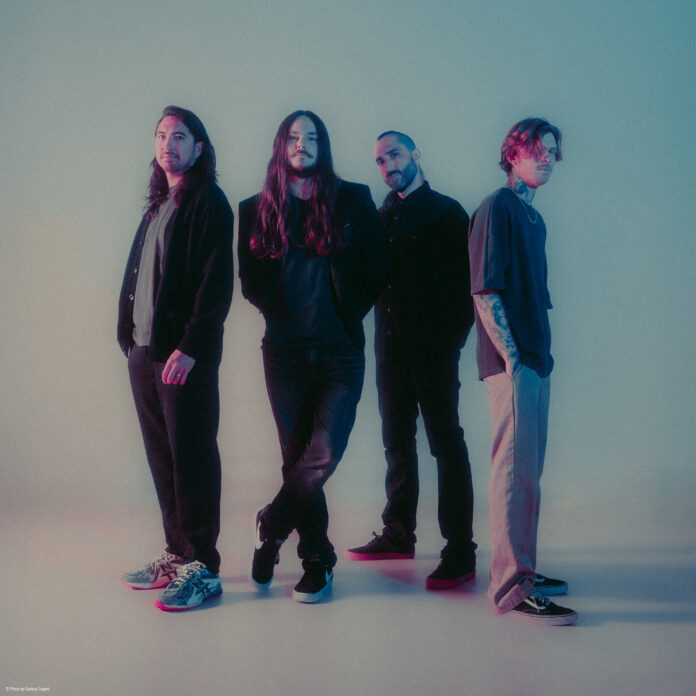


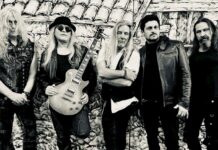


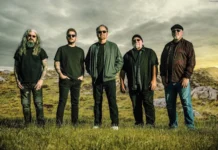


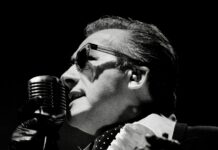
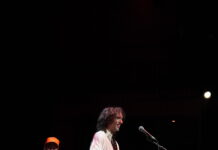

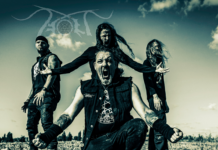
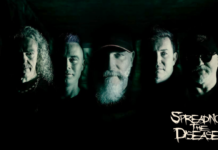

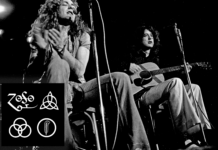
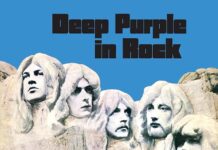
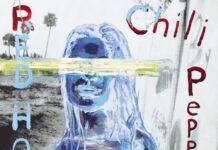
New Music you may like:
https://www.youtube.com/channel/UCIp-OOBWwLOLRs3tcd0GQWg